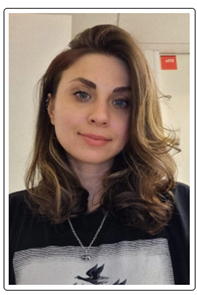
Background:
I am interested in how interactive environments (both real-world and virtual), and our beliefs about them, affect our cognition and behaviour, and what underlying neural mechanisms are engaged in these effects. My undergraduate research has tested memory retention and retrieval in real-world versus immersive virtual reality, while my Masters research looked at immersive co-presence implementations in remote education, piloting an experiment on performance changes during immersive virtual co-presence.
PhD Research:
The aim of my PhD is to investigate how subjective beliefs about virtual companion’s agency, such as whether the companion is a human or an AI, impacts behaviour and cognitive performance in remote online and immersive virtual environments. In order to establish a naturalistic social interaction and to quantify the virtual experiences, I am using methods such as online video interaction, interactive immersive virtual (VR) environments and scripted real-world scenarios. The research is currently conducted on a neurotypical adult population, with consideration of how individual differences, for example, social anxiety and autistic traits, mediate social effects in question.
Application:
The COVID-19 pandemic has emphasised the importance of being able to socially interact with others. However, the shift to remote social interaction and the resulting inability to physically share experiences has caused people to feel less connected and more exhausted after the long virtual interactions (“Zoom Fatigue”). Additionally, the current social interactions are becoming more complex and augmented, considering the communication is no longer limited to other people and AI-assistants are becoming are daily virtual companions. This research aims to improve understanding of how our brain processes social information and how social technology impacts our cognition, hopefully paving the way to more wellbeing focused and inclusive social technology and interactive environments.
Supervisors:
Prof Tim J Smith, Dr Atsushi Senju
Funding body: 1+3 UBEL – DTP (ESRC Studentship by UKRI)
Education:
PhD Student, Centre for Brain and Cognitive Development, Birkbeck (October 2018 – present)
MSc Educational Neuroscience (Distinction), Birkbeck and UCL Institute of Education (2017-2018)
BSc Hons Psychology, Neuroscience Pathway (First Class), Birkbeck College, University of London (2013-2017)
Publications:
Sutskova, O., Senju, A., & Smith, T. J. (in press). Impact of Video-Mediated Online Social Presence and Observance on Cognitive Performance. Technology, Mind & Behavior. DOI: https://doi.org/10.17605/OSF.IO/MBRZT [Preregistered Report].
Talks:
Sutskova, O. (2021). Social VR and Second-Person Cognition: The Impact of Virtual Social Presence on Cognitive Performance. CBCD Seminar Series 2021, Centre for Brain and Cognitive Development: London, United Kingdom. http://www.cbcd.bbk.ac.uk/events
Public Engagement:
Co-Organising CBCD Seminar Series (October 2020- October 2021)
Twitter: @VrBrainStats
LinkedIn: Olga Sutskova
Affiliation: Birkbeck, University of London; Centre of Brain and Cognitive Development(CBCD); CINELab







